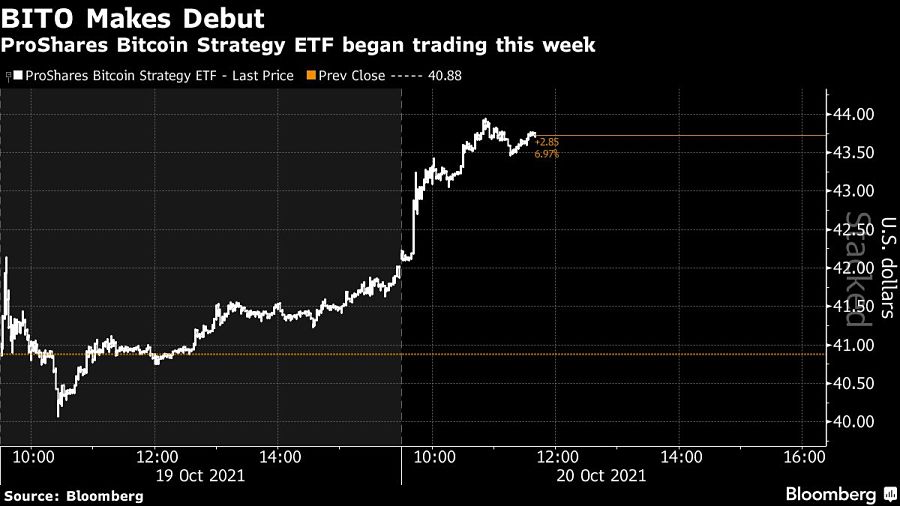

The race is on to cut costs on U.S. Bitcoin futures exchange-traded funds, just a day after the first ETF launched.
VanEck’s pending Bitcoin Strategy ETF (XBTF) will carry a management fee of 0.65%, meaning $6.50 for every $1,000 invested. That would undercut the 0.95% expense ratio on ProShares Bitcoin Strategy ETF (BITO), which debuted Tuesday.
The VanEck fund’s effective date is Saturday, Oct. 23, the company said in an updated prospectus. And a VanEck spokesman said the firm anticipates launching it “as soon as practicable” after that.
“The decades-long fee war has a new battle with Bitcoin ETFs,” Todd Rosenbluth, head of ETF and mutual fund research at CFRA, wrote in an email. “When an ETF comes to market second or third with a nearly identical product, it can be at a disadvantage unless it can stand out with a lower fee.”

Fights over fees are nothing new in the booming $6.8 billion ETF industry, as each new fund seeks to gain market share by offering a lower price than the competition. Actively managed funds are able to charge slightly more than passive ETFs, with the average fee for active equity funds clocking in at 0.71%. BITO is actively managed, and the prospectus for XBTF indicates that it will be as well.
“We were the first asset manager to file for a Bitcoin futures ETF, and we are offering what would be most competitively priced ETF when we come to market,” said Ed Lopez, head of ETF product at VanEck.
The 30-basis-point difference in management fees should help the VanEck ETF attract demand, even after the ProShares fund’s record-shattering debut. More than 20 million shares of BITO traded Tuesday, ranking it as the second-busiest ETF launch ever.
“Investors are looking for the cheapest way they can obtain exposure” to Bitcoin, said Mohit Bajaj, director of ETFs at WallachBeth Capital. “Especially if the instruments they are choosing between are correlated.”

A Texas-based bank selects Raymond James for a $605 million program, while an OSJ with Osaic lures a storied institution in Ohio from LPL.

The Treasury Secretary's suggestion that Trump Savings Accounts could be used as a "backdoor" drew sharp criticisms from AARP and Democratic lawmakers.

Changes in legislation or additional laws historically have created opportunities for the alternative investment marketplace to expand.

Wealth managers highlight strategies for clients trying to retire before 65 without running out of money.

Shares of the online brokerage jumped as it reported a surge in trading, counting crypto transactions, though analysts remained largely unmoved.
Orion's Tom Wilson on delivering coordinated, high-touch service in a world where returns alone no longer set you apart.
Barely a decade old, registered index-linked annuities have quickly surged in popularity, thanks to their unique blend of protection and growth potential—an appealing option for investors looking to chart a steadier course through today's choppy market waters, says Myles Lambert, Brighthouse Financial.
